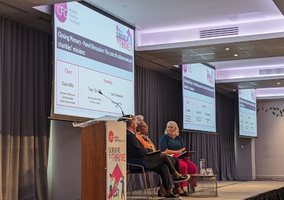As government policy and public opinion towards migrant communities becomes more hostile and extreme, at the Migrants’ Rights Network, we have been constantly asking ourselves the same question: as migrants’ rights advocates, can we truly be committed to achieving migrant justice while advocating for reforms that keep oppressive systems intact?
Upholding the status quo
When the government introduced its inhumane illegal migration bill in March, a huge bulk of mainstream opposition was calling for amendments.
Campaigns around detention were a prime example of this. A key government concession took the form of an amendment stating pregnant women can only be detained for a maximum of 72 hours. This was largely seen as a victory, but for those of us championing a transformational approach, it is simply not good enough: one hour in detention is an hour too long. These kinds of amendments are also aimed at alleviating the suffering of one group, while others are left to suffer.
In Against Borders, the authors argue that all the state has to do is threaten regressive legislation to “keep us defending an already unjust status quo”. Charities must be careful not to fall into this trap.
Abolition
We all work in this sector because we want to reduce suffering and fight for what is right. But often, our desire for immediate change can cause us to become indifferent, and accept concessions at the expense of our end goals.
Equity for migrants and racialised people cannot be achieved through our current systems. They are inherently racist and colonial in nature, and so there is no fixing what is purposefully designed to oppress.
We must as a sector look towards abolitionist alternatives centred on collective care. This involves ending the criminalisation of migration in all its forms, including ending surveillance, detention, and deportation.
Understanding root causes
We must first recognise the root causes of migration. The sector has generally failed to consider the colonial causes of migration and displacement, or to interrogate the racism embedded within mainstream discourses on migration. It has also struggled to evolve beyond a single-issue approach, or to consider the intersections between migration and various structures of oppression.
At MRN, we know that we cannot talk about migration, and the contemporary discourse surrounding who is welcome in this country, without also talking about colonialism, race and class.
This intersectional approach lies behind all of our campaign work. Understanding that the entirety of the immigration system is built on racism is a first step in realising that reform is untenable.
Rejecting division
The sector unintentionally often focuses on the “hardworking” nature of migrants or their “contributions”. This is because it has internalised the government’s divisive narratives. This keeps the system intact: it pits different marginalised communities against each other, and assigns value or worth to human life based on one’s level of “contribution”.
Our Words Matter campaign has explored the various language choices that harm migrant communities instead of uplifting them. We can all do better with our language choices, by thinking critically, questioning the narratives that we are fed, and understanding what systems they are ultimately serving.
Building solidarity
EDI initiatives love to throw around the phrase “lived experience”. At MRN, we have been on a journey with this phrase and how it relates to our strategy.
Ultimately, possessing lived experience does not always mean that someone will also possess progressive values.
Uncritically accepting someone’s problematic values or behaviours simply on account of their marginalised identity, is antithetical to building solidarity and transformational change.
This is why we are both lived experience-led and values-led, since liberation goes beyond representation. We believe that those with lived experience, whose values of compassion are directly informed by their personal lives, are best placed to transform our society for the better.
A culture of humility
Our above reflections were born out of an intense journey of self-reflection and questioning. During this time, we consulted with migratised communities in our network, and thought long and hard about what solidarity actually means.
When faced with criticism, we have used this as an opportunity to grow, instead of resorting to deflection. We have realised that our good work in some areas does not absolve us of causing harm in other ways, and we recognise that our learning journey is a lifelong one.
Once we recognise that we still have so much work to do as a sector, only then can we change our approach to growth. Showing true solidarity to migrants and racialised communities involves a willingness to always do better. This can be uncomfortable, but it is necessary.
We must all adopt a culture of humility: we shouldn’t gaslight or be on the defensive when we receive criticism, but should thank those who call us out for their time and energy. Let’s be accountable to each other, and to ourselves.












